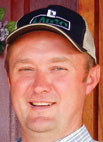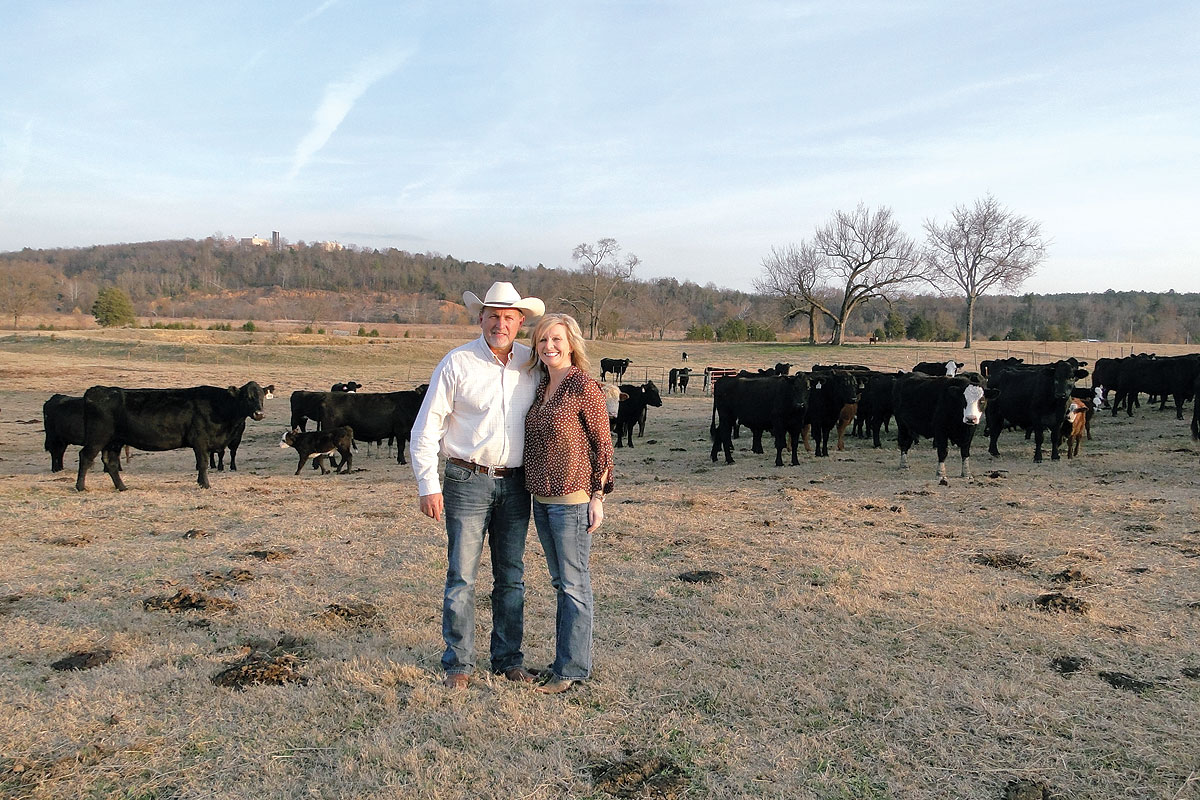
The Flying C Ranch moves from a commercial herd to farm-fresh beef sales
Robert Clark was raised on a small dairy farm and became a surgeon in Conway, Ark. Nonetheless, he never forgot his farming roots and his father’s small dairy.
Robert wanted to live on a ranch and raise commercial beef. He purchased his first piece of land in 1980, which contained 55 acres and a house. He also bought 16 cow/calf pairs and began developing a herd. In the beginning he experimented by breeding his cows to different registered bulls, learning and changing according to market trends. He also purchased additional acreage as it became available, some in Conway and some in Mayflower, with a current total of 1,000 acres and 160 momma cows.
Robert and Leanna have six children with son Michael now managing the ranch. Before 2012, the goal was to raise 100 to 120 calves to sell at the sale barn. Between 2012 and 2014, they decided to retain ownership when they sent their cattle to Kansas to be finished in order to get information on the quality of the cattle and meat. They learned the meat was good, but that they needed to pay more attention to genetics because by doing so they could produce a healthier protein product. At the time market prices were very good but they knew those prices couldn’t be sustained. Consequently, they decided to go into a niche market and sell farm-fresh beef through the farmers market.
Herd size, which at the time was 300 mommas, was decreased to 150 mixed mommas bred by both black and Red Angus bulls. Genetic testing continues to be used on possible replacement heifers so only the best are kept. The quality of meat soared. Further, their experience showed that the genetics of the Red and black Angus significantly differed in terms of tenderness, so much so that they can tell by just looking at calves which will produce the best marbling.
“We wanted two things,” explained Leanna. “We wanted to offer better meat and to educate people about healthy protein choices. Most don’t understand the food chain or how the animals are raised.”
The Clarks insist on a humane treatment in a low-stress environment. The cattle always receive clean water from 13 water tanks with ponds fenced off according to NRCS standards and the clean water program to minimize pond access. However, they decided to use tanks only after their own controlled study. Cattle were given a choice between tank water and pond water and emptied the tank overnight. Their current water project is fencing off the creeks.
A critical part in the evolution of the Clark model occurred when Leanne retired as a nurse in 2013 and was afraid she wouldn’t have enough to do. She consequently started selling jellies and baked goods such as a tender and wonderfully tart but sweet lemon bread at the farmers market. Then beef was added which they started selling by the quarter or the half. Through time the sales of the jelly and baked goods decreased but freezer beef, which has expanded to include grilling and smoking products as well as quarters and halves, has steadily increased.
Another part of the Clark evolution was the development of materials for public education. They use two handouts from the Beef Checkoff program, which explain the health advantages of beef and of grain-finished beef over grass-finished beef. They also created their own brochure with emphasis on handling, genetic testing and the results of their genetic program. Other handouts include a price list and an explanation of what can be expected from purchasing in bulk. In order to help customers expand their cooking methods and use of different cuts of beef, a variety of easy to follow recipe cards are available, which range from slow cooker cube steak to stuffed peppers to fajitas and soups. Additionally, the Clarks offer changing promotional programs, such as gift cards in the freezer bags of meat.
A final component of their educational efforts is promoting beef in general and their own products through farming associations such Farm Bureau and the Cattlemen’s Association. They sponsor events such as mom-to-farm tours and children’s programs. They were named the 2018 Farm Family of the Year.
“We come by our dedication to education honestly because my mom has always been involved in nursing fostered by a passion to help people,” Michael said. “She simply changed her focus from illness to farming, and promoting purchasing meat off-the-farm rather than a grocery store. We welcome visitors because we believe in transparency and want people to see exactly how animals live and are treated. If they choose, they can even come to the farm and pick out which steer they want.”
The Clarks follow a herd health program, which includes working with Dr. Shurtleff of Morrilton, Ark., to refine their vaccination program with an emphasis on respiratory diseases. They use an oral wormer and Safeguard cubes in their feed, and use pour-on and injectable wormers a maximum of twice a year to prevent resistance. Flies are controlled through a Purina mineral as well as ear tags which are particularly important, according to Michael, because weather patterns seem to be changing into an abrupt transition from winter to summer with little spring or fall.
Land also receives careful attention. They use rotational grazing and raise and harvest 1,500 round bales of hay annually to meet their needs. Kevin Lawson from the University of Arkansas who helped them develop plots to bridge the gap from August to Labor Day using Pearl Millet.
Flying C Ranch’s evolution from a small commercial herd to a thriving off-the-farm beef business is not by accident. The family works together and coordinates a system that produces high quality farm fresh beef.






